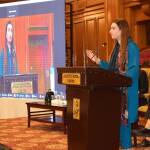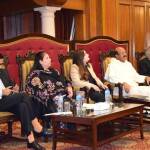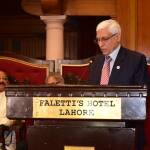LAHORE, Pakistan: The National Conference on the “Future of Interfaith Relations in Pakistan” was organized in Lahore on Tuesday under the auspices of the Center for Social Justice (CSJ).
The Conference was largely attended by civil society organizations, human rights activists, lawyers, journalists, and political representatives, and religious minority leadership.
Dr. Qais Aslam, Bushra Anjum Butt, Dr. Sara Rizvi Jafree, Dr. Syeda Mehnaz Hassan, Dr. Raana Malik, Dr. Yaqoob Khan Banagsh, Peter Jacob, Bishop Azad Marshall, and Fr. James Channan, joined as the speakers who discussed impediments and way forwards regarding the interfaith relations.
Dr. Qais Aslam, a distinguished professor and economist, described the religious, ethnic, and cultural diversities of Pakistan. He stated that “Pakistan is home to multi-cultural, multi-ethnic and multi-religious communities, where the constitution of Pakistan recognizes rights to equal opportunities for everyone, and therefore cannot fail to abide by our constitution about respecting this diversity of culture, ethnicity, gender, and religious beliefs and find the skills of individuals and groups for a more progressive and economically viable Pakistan where our children can live in harmony and peace.”
Bushra Anjum Butt, educationalist and Member of the Provincial Assembly of Punjab, emphasized that the need to work towards a more tolerant society, where religious acceptance is a grand norm.
Sociologist, researcher, and academic Dr. Sara Rizvi Jafree evaluated the social and economic status of religious minorities in Pakistan, as of her opinion “there is a complex linear relationship between the low socio-economic status of religious minorities in Pakistan and high levels of religious intolerance. Addressing and improving tolerance through interfaith harmony is the first step forward to improving the status of religious minorities in the country”.
An academic, social scientist and researcher Dr. Syeda Mehnaz Hassan stressed upon the policy reformers with regards to religious minorities while speaking at the conference she said that” every religion must be integrated in the policy-making process to spread the knowledge among the general public and to aware them about their basic rights as a responsible citizen of the state of Pakistan. To incorporate each state citizen in the policy process, the state needs to implicate societal modification and positive presentation. Pakistan is very rich in its culture and history so there are many religious places of Hindus, Sikhs, and Christian communities. So, a multi-cultural and multi-religion existence is very important in our education, trade, and art. It is an obligation of the state to safeguard the remarkable religious histories and cultures of Non-Muslims to provide them a strong and peaceful presence in Pakistan.”
Advocate Saroop Ijaz, a famous legal expert, expressed his views on the well-discussed idea of equal citizenship. He shared his point of view as the “Equality of citizenship is a precondition for any modern functioning democracy. The future of interfaith relations rests on acknowledging and ensuring equality. While, our constitutional framework provides a template for peaceful and harmonious co-existence, unfortunately not all of our laws adhere to that framework. That has to change. The implementation of existing laws needs to be improved. Our laws need to be brought in line with constitutional and international law principles.”
Fr. James Channan, a well-known peace activist, while describing the significance of interfaith dialogues, said, “Interfaith dialogue is of grave importance in the world and Pakistan. Such encounter among the people of different religions is a must to overcome the tensions and divisions such as violence, hatred, and discrimination on the basis of caste, creed and religion in our society. Interfaith will help to create a tolerant and peaceful civil society.
It is very important for our government to have such policies and implement them in the schools and grassroots level. Electronic and print media to promote this. Our government has already made some steps towards this and needs to do much more to make our country very peaceful and harmonious.
Bishop Azad Marshall, the Moderator Bishop of the Church of Pakistan, stressed to learn from the successes achieved by Jamia Al-Azhar, Egypt, and Friendship Centre under Abraham Accord in UAE. He underlined the importance of the political will of the leadership to see beyond the manifestation particularly the root causes of the stress in the communal relationships.
Dr. Yaqoob Khan Banagsh emphasized the equality of rights and opportunities among citizens, which he said was had equalizing and stabilizing effect on society.
Peter Jacob, the Director of the Centre for Social Justice, made the following observations and recommendations as a result of the deliberations:
- Social intolerance, land grabbing, hate speech and forced conversion of minorities which appears to be the chief causes needs to be addressed through legislative administrative, and educational measures, including;
- Ensure implementation of the Supreme Court judgment of 19 June 2014 about the protection of minorities’ rights, in letter and spirit particularly directive.
- Legislate for the prohibition of forced conversion,
- The Senate must avoid approval of the bill passed by the National Assembly on 26th June 2021, till amend into comprehensive legislation, after proper assessment of the issue and the possible resolve illegal transfer or sale of communal properties.
- The Sikh and Hindu Community must be given adequate representation and leadership in the ETPB and the opportunity to bring the matters related to effective management of Gurdwaras.
- Ensure that communal properties under the Evacuee Trust Property Board are not illegally transferred, encroached upon or sold to anyone.



